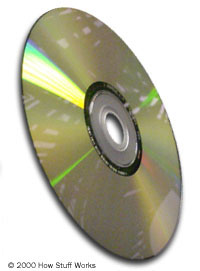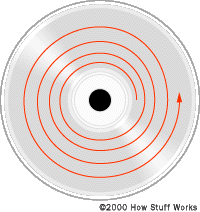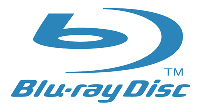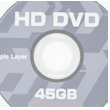| (insert your NIE or newspaper logo here) |
Weekly Online LessonOnline Lesson ArchiveGrade Level: 6-8
|
Truce Unlikely In DVD Wars
 For
months now, electronics companies Sony and Toshiba have been fighting
for dominance in the future DVD market.
For
months now, electronics companies Sony and Toshiba have been fighting
for dominance in the future DVD market.
While Sony is pushing its Blu-ray disc, Toshiba and NEC want their HD DVDs to rule as the entertainment industry's next generation of DVD.
Some analysts liken the DVD format wars to the one between Betamax and VHS video tapes in the 1980s. The more likely scenario in this case is that case both DVD formats will openly compete in our entertainment world.
In fact, with no sure single winner on the horizon, Warner Bros., one of the largest movie entertainment companies in the world, announced on Friday, October 21, 2005, that it would support both Blu-ray and HD DVD formats.
Earlier this month, Paramount Home Entertainment made a similar announcement.
Meanwhile, others have split onto one side or the other. Last month, for example, computer giants Intel and Microsoft chose to support HD DVD technology. Other companies, including Dell and Apple, have camped out with the Blu-rays.
Consumers may end up not caring either way, as most DVD players and computers will likely work with either format.
To understand what's at the heart of these DVD wars, this week you'll get a grasp on basic DVD technology and discover the differences between Blu-ray discs and HD DVDs.
How DVDs Work
 Without
a doubt, home entertainment has been enhanced by the move from analog
VHS video tapes to digital DVDs.
Without
a doubt, home entertainment has been enhanced by the move from analog
VHS video tapes to digital DVDs.
So to begin your lesson, find out How DVDs Work at the How Stuff Works site.
As you explore, click any underlined word for more information about that term. Read the introduction, then get on with The Basics
What are some differences between a DVD and a CD? In what ways do DVDs offer movie viewers more choices and flexibility compared to a more traditional VHS video tape?
Next, learn more about Storing Data on a DVD and compare Data Storage: DVD vs. CD.
What exactly is a DVD composed of? What units of measure are used to describe the size of the data tracks? What similarities and differences exist between DVD bumps and pits on an old vinyl music record? Why can a DVD store more data than a CD?
Now, take a look at the DVD Video Format that gets stored onto the disc.
Why is video compression vital to making and using DVDs? How do NTSC and PAL formats compare to one another? What exactly does an MPEG encoder do? What are the three different ways a frame can be encoded?
Think about your favorite movie, comparing two or more different scenes. Which scenes would use which types of encoding the most? Which scenes could be compressed the most and why?
 What
improvements to sound quality will DVD
Audio bring to our music-listening future? What are the current
limitations to consumers?
What
improvements to sound quality will DVD
Audio bring to our music-listening future? What are the current
limitations to consumers?
Okay, so you've looked at DVDs inside and out -- now it's time to find out how The DVD Player transforms the disc bumps into television pixels.
What are the player's three fundamental components? How exactly does the player use light to decode the data? Why does the revolving speed vary as the player reads the disc?
What other kinds of Features can a DVD player have?
Of course, you won't be able to watch a DVD on your television if you're not familiar with the player's Outputs and how to Connect the DVD Player to your TV.
What are the different types of video and audio outputs? If your household has a DVD player, or a VCR, which outputs does it include? Why do you think audio and video have separate outputs?
Next, discover the differences between DVDs and Laserdiscs. Also, review the FAQ.
So what did "DVD" originally stand for? What are the differences between DVD+R and DVD-R? What is the purpose of region codes?
If you have time, compare DVD technologies with How VCRs Work.
Blu-ray & Beyond
 Now
that you understand how traditional DVDs work, dive into the
next generation of digital entertainment with a look at How
Blu-ray Discs Work.
Now
that you understand how traditional DVDs work, dive into the
next generation of digital entertainment with a look at How
Blu-ray Discs Work.
Read the introduction, and then find out What Is a Blu-ray Disc? and How Does a Blu-Ray Work?
Why do high-definition movies need more data storage capacity than the standard movies found on today's DVDs? Why are Blu-ray discs a better choice for hi-def movies than conventional DVDs?
What color of laser do traditional DVD players use, and why do Blu-ray disc players use a blue laser? How does this relate to the Blu-ray's improved data storage capacity? What other advantages will Blu-ray discs offer compared to conventional DVDs?
Next, see how Building a Blu-ray compares with building a CD or regular DVD.
What does "birefringence" mean? In what way does reading a Blu-ray compare to reading a DVD? How do the discs compare in how they are produced?
 As
recent news illustrates, Blu-rays aren't the only next-gen contenders
in the DVD market.
As
recent news illustrates, Blu-rays aren't the only next-gen contenders
in the DVD market.
See how the contenders match up: Blu-ray vs. Other New Disc Formats.
So how does Blu-ray compare to HD DVD in terms of advantages and disadvantages? What other format is Warner Bros. embracing? In what other kinds of electronics products have you witnessed this kind of competitiveness between rival companies? What kinds of factors, do you think, contributes to the success of one particular brand over another?
Finally, find out When Blu-ray Will Become Available. What technological, economic, or social conditions will drive consumer demand of Blu-ray products? What changes must occur for consumers to shift from old technologies to new ones?
Newspaper Activities
In current issues of The Salt Lake Tribune, find advertisements of two very similar products from different manufacturers: mobile phones, appliances, car tires, movies, etc. Examine the ads and write a list of product features and, if possible, competitive advantages. Maybe one product claims to cost less, while a competing product boasts of higher quality or a better warranty. After comparing the features and advantages of each, which would you purchase? Which product do you think will be more successful in the marketplace? Be prepared to explain your reasoning to a friend, parent or teacher.
© Copyright 2005
Learners Online, Inc.
